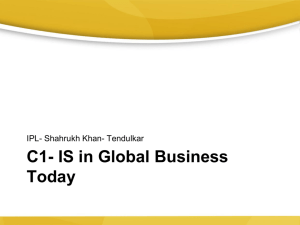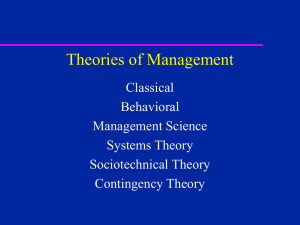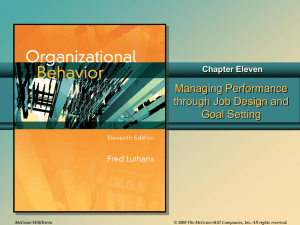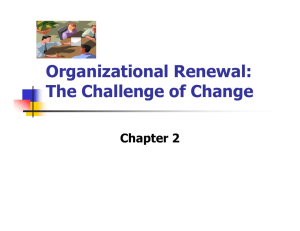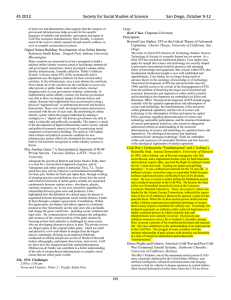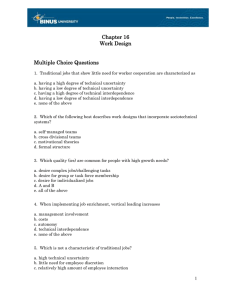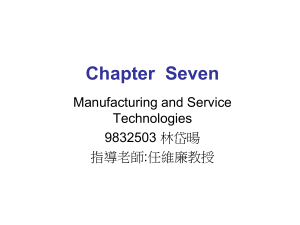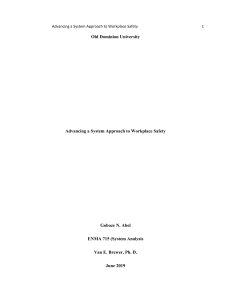Chapter Sixteen: Work Design Organization Development and Change Thomas G. Cummings
advertisement
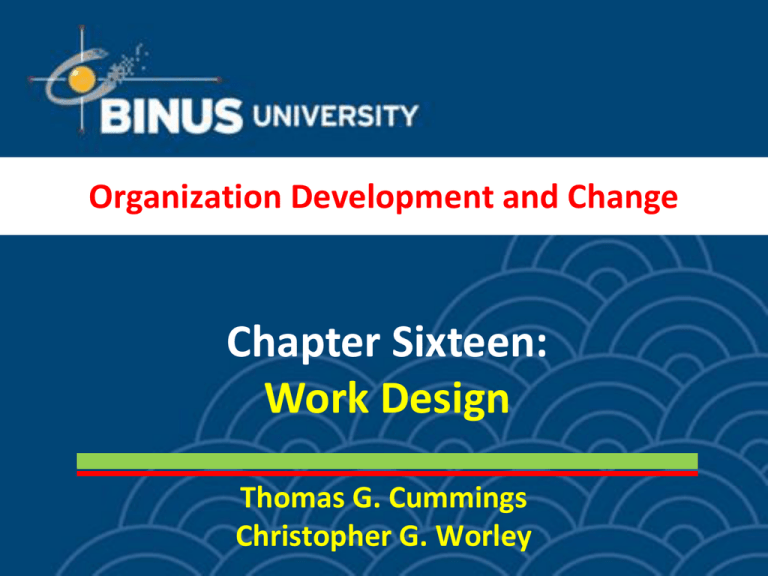
Organization Development and Change Chapter Sixteen: Work Design Thomas G. Cummings Christopher G. Worley Learning Objectives for Chapter Sixteen To explore work design as a central component of many EI interventions To approach work design from three different perspectives: engineering, motivational, and socio-technical To understand how different approaches align with different technical and social conditions 16-2 Work Design Approaches Engineering: Traditional Jobs & Groups High specification and routinization Low task variety and autonomy Motivational: Enriched Jobs High task variety and autonomy Feedback of results Sociotechnical: Self-Managing Teams Control over total task Multi-skilled, flexible, and self-regulating 16-3 Traditional Jobs & Workgroups Based on Scientific Management Highly specified behaviors Narrow range of skills Low levels of authority and discretion Highly repetitive Benefits Low selection and training costs High productivity High levels of control 16-4 Enriched Jobs Core Job Characteristics Critical Psychological States Skill variety Task identity Task significance Experienced Meaningfulness of the Work Autonomy Experienced Responsibility Feedback from work Knowledge of Actual Results Outcomes • Hi internal work motivation • Hi growth satisfaction • Hi job satisfaction • Hi work effectiveness Moderators 16-5 Core Job Dimensions Skill Variety - extent to which multiple skills are used Task Identity - extent to which an individual works on a “whole” task Task Significance - impact of the work on others Autonomy - amount of discretion in the work Feedback from the Work Itself - extent to which work provides information on effectiveness 16-6 Job Enrichment Application Stages Perform a thorough diagnosis Form natural work units Combine tasks Establish client relationships Vertical loading Opening feedback channels 16-7 Sociotechnical Systems Approach Sociotechnical systems (STS) theory is based on two basic ideas: An organization or work unit is a combined, social-plus- technical system (sociotechnical) The system is open in relation to their environment and must interact with their environments to survive and develop Self-managed work teams is the most prevalent application of STS 16-8 Sociotechnical Systems Diagnosis Define the Work System Conduct an Environmental Analysis Conduct a Technical Analysis Conduct a Social Analysis 16-9 Sociotechnical Systems Design Can work system be designed to better fit with the environment? Can work system be designed to better operate conversion process and control variances? Can work system be designed to better satisfy members’ needs? 16-10 Team Task Design & Development Whole and interdependent tasks Common mission and goals Requisite multi-skills Task and boundary control Feedback of results Minimum specification design Develop from narrow to broad boundaries for discretion 16-11 Team Process Intervention Promoting healthy interpersonal relationships Coordinating efforts Weighting member inputs and sharing knowledge Making good decisions Confronting and resolving conflicts 16-12 Organization Support Systems Performance MANAGEMENT SYSTEMS Training SYSTEMS Information SYSTEMS Selection SYSTEMS Management SYSTEMS 16-13 Self Managed Teams Application Stages Sanction the design effort Diagnose the work system Generate appropriate designs Specify support systems Implement and evaluate the work design Continual change and improvement 16-14 Designing Work for Technical and Personal Technical Factors Technical interdependence: the extent to which cooperation among workers is required Technical Uncertainty: the amount of information processing and decision making among workers necessary to do the work Personal Need Factors Social Needs: the desire for significant social relationships Growth Needs: the desire for personal accomplishment, learning, and development. 16-15 High Technical Uncertainty Low Work Designs That Optimize Technology Traditional Job Design Traditional Work Groups Enriched Jobs Self-Regulating Work Groups Low Technical Interdependence High 16-16 High Growth Needs Low Work Designs that Optimize Personal Needs Traditional Job Design Enriched Jobs Low Traditional Work Groups Self-Regulating Work Groups Social Needs High 16-17 2-18
